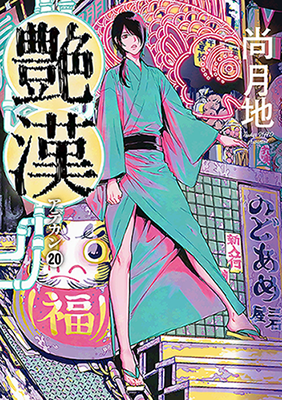There seem to be any number of weird, shallow, overly-fangirly or unfairly critical comments on this page and almost nothing that provides a really good picture for potential readers (except tartufo's comment: it's brilliant and funny, scroll down and read it!) I'll try to level the field a bit.
Setting: Though ostensibly set in Shouwa era Japan, Adekan incorporates elements of medicine, science and criminal psychology that would not have been known to people at the time. There's also a definite - if vague - supernatural element in the biology, abilities and origins of the major antagonists: a subspecies of humans known as Super Humans.
Plot: Adekan is what we here on MU have dubbed "Episodic with underlying continuous plot." The story unfolds as a series of criminal cases taking place in Gentou-chou, the town where the protagonists live. Since Koujirou is a police officer, he naturally looks into anything odd he notices, while Shiro gets involved for two reasons: either to help Koujirou out or because the case involves his species/tribe, the super humans (which, considering that they seem to enjoy experimenting on humans with a view towards ruling over them in the future, happens quite often). So unlike what a previous comment mentioned, there's nothing especially contrived about the MCs' encounters with criminals; at least no more than any other detective story.
But all the episodic cases merely lay the groundwork for a much larger plot: one involving Shiro, his childhood friend Anri, Koujirou and indeed all the humans and super humans, in what's shaping up to be an all-out war between (sub?)species. The hints were firmly established from the first volume onwards, so it's clear that the mangaka had a plan from the beginning and isn't making things up at random - which is more than I can say for a lot of long-running series.
Characters: The cast is large, and while only about twenty characters are recurring, for the duration of their appearance each person plays a clear role in the plot: whether as one-offs in the case file chapters or as unexpectedly significant personages later on. The readers are often left guessing as to who'll play a role in the main plot, which is always a plus. Since most of the case file arcs are psychologically driven and focus on the mentality behind crimes and those who commit them rather than the actual whodunnit, many of the perpetrators and victims are neither particularly sympathetic nor wholly unsympathetic, in the fashion of people IRL. I found this intriguing, especially coming from a shoujo manga.
Someone below has wondered why Shiro and Anri "look/act like prostitutes." The simple answer to that is: they were prostitutes. They grew up in an extremely terrible society where "survival of the fittest" was taken to its logical extreme and, being of low birth, had to seduce their way to the top by charming any man or woman they could. Personally, I find that this makes Shiro a very interesting choice of protagonist and Anri a charming-but-deadly opponent.
Fanservice: As my topic should make clear, the fanservice component of Adekan is simply a gender-flipped version of a standard ecchi manga. Men frequently end up in sexually suggestive poses, either by accident or on purpose. Any possible opportunity to draw the male characters half-naked or bathing or in some other state of un/dress that shows off their greatest assets (Koujirou's 12-pack and Shiro/Anri's androgynous seductiveness) is jumped upon. It's as straightforward as that, and nothing for anyone to complain about or be puzzled over.
BL: There is no shounen-ai or yaoi here, and there never will be. While there's no doubt that the most important relationships in the story are Shiro and Anri's childhood friendship/pseudo-enmity and Koujirou's adamant desire to protect Shiro (and vice-versa) that's rooted in their as-of-yet-unrevealed childhood bond, there's equally no doubt that they'll never go beyond platonic love. In fact, all the main male characters hit on/appreciate women at every opportunity and Shiro even develops romantic feelings a few times, though he rejects the girls because his dangerous lifestyle makes him an unsuitable candidate for a lasting romance. But this is female-oriented ecchi, and in true ecchi fashion there are intentional sexual undertones to the character interactions (whether between guy and girl or two guys) that are included solely for the sake of attracting the female gaze; hence all the pointless speculation.
Mood/Humour: Another thing I find interesting about Adekan is its juxtaposition of cruelty and kindness, evil and good, ugliness and beauty. You can never tell which you'll get in which chapter: some of the mysteries end in tragedy, some are bittersweet, others are quite happy. Likewise, the main plot frequently cuts from a scene of the protagonists and their friends/family having fun to one of people being brutally tormented and driven into despair with no hope in sight. Though I do agree, to an extent, with the person who dubbed the series as "bipolar," I also find this unusual approach to storytelling a refreshing breach of the norm.
That being said, the (plentiful) jokes are either dry/witty, blue or black, so you may need an unusual sense of humour to be able to appreciate them.
Art: The artwork is unique, elaborate and stylised; a true feast for the eyes.
In sum: A worthy choice for female readers who like a good plot, don't mind a hefty dose of male fanservice, and can tolerate/enjoy BL subtext played for laughs/eroticism. Not at all recommended for straight guys or conservative women.





